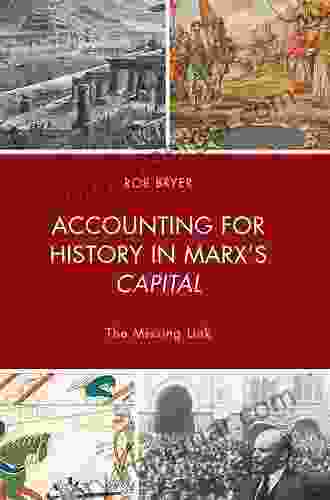Accounting for History in Marx's Capital: Unveiling the Profound Insights

: Accounting as a Lens on Historical Events

4 out of 5
| Language | : | English |
| File size | : | 2774 KB |
| Text-to-Speech | : | Enabled |
| Screen Reader | : | Supported |
| Enhanced typesetting | : | Enabled |
| Word Wise | : | Enabled |
| Print length | : | 439 pages |
In Karl Marx's seminal work, "Capital," accounting emerges as an indispensable tool for understanding the historical evolution of capitalism. Marx argued that accounting practices are not merely technical tools for recording financial transactions; rather, they reflect the underlying power relations and class struggles that shape human history.
Accounting and the Genesis of Capitalism
Marx believed that the development of accounting systems was inextricably linked to the rise of capitalism. The emergence of private property and the separation of labor from capital necessitated the creation of methods to measure and control economic activity.
Double-entry bookkeeping, a cornerstone of modern accounting, played a pivotal role in facilitating trade and commerce. By providing a clear record of transactions, it allowed merchants and capitalists to track their profits and losses, manage risk, and make informed investment decisions.
Accounting as a Tool of Class Struggle
While accounting initially served the interests of the ruling class, Marx argued that it also became a weapon in the hands of the working class. Labor unions and other workers' organizations used accounting to challenge capitalist exploitation and demand fair wages and working conditions.
By exposing the hidden profits and surplus value extracted by capitalists, accounting became a powerful tool for exposing the contradictions and injustices inherent in the capitalist system.
Accounting and the Historical Process
Marx viewed accounting as a crucial element in the historical process. He believed that the way in which societies organize and record their economic activity reflects their underlying social and political structures.
For example, the shift from feudal accounting to capitalist accounting mirrored the transition from feudalism to capitalism. The emergence of cost accounting and efficiency measures reflected the growing emphasis on productivity and profitability in the capitalist mode of production.
Accounting and the Future of Capitalism
Marx's analysis of accounting has profound implications for understanding the future of capitalism. He argued that the contradictions inherent in the capitalist system would eventually lead to its collapse.
Accounting, as a tool for both exploiting and exposing capitalist exploitation, will continue to play a vital role in shaping the course of history. It can serve as a weapon for the working class and a catalyst for social transformation.
: Accounting as a Historical Force

Karl Marx's "Capital" provides a profound analysis of the role of accounting in shaping historical events. Accounting is not simply a technical tool for recording financial transactions; it is a reflection of social and political power relations and a tool for class struggle.
Marx's insights challenge us to critically examine the role of accounting in our contemporary societies. By understanding the historical significance of accounting, we can gain a deeper comprehension of capitalism and its future trajectory.
References
- Marx, Karl. "Capital: A Critique of Political Economy." Translated by Ben Fowkes. Penguin Books, 1990.
- Sombart, Werner. "Capitalism." Translated by M. Epstein. Harper & Row, 1966.
- Weber, Max. "The Protestant Ethic and the Spirit of Capitalism." Translated by Talcott Parsons. Routledge, 2005.
4 out of 5
| Language | : | English |
| File size | : | 2774 KB |
| Text-to-Speech | : | Enabled |
| Screen Reader | : | Supported |
| Enhanced typesetting | : | Enabled |
| Word Wise | : | Enabled |
| Print length | : | 439 pages |
Do you want to contribute by writing guest posts on this blog?
Please contact us and send us a resume of previous articles that you have written.
 Book
Book Novel
Novel Page
Page Chapter
Chapter Text
Text Story
Story Genre
Genre Reader
Reader Library
Library Paperback
Paperback E-book
E-book Magazine
Magazine Newspaper
Newspaper Paragraph
Paragraph Sentence
Sentence Bookmark
Bookmark Shelf
Shelf Glossary
Glossary Bibliography
Bibliography Foreword
Foreword Preface
Preface Synopsis
Synopsis Annotation
Annotation Footnote
Footnote Manuscript
Manuscript Scroll
Scroll Codex
Codex Tome
Tome Bestseller
Bestseller Classics
Classics Library card
Library card Narrative
Narrative Biography
Biography Autobiography
Autobiography Memoir
Memoir Reference
Reference Encyclopedia
Encyclopedia Thomas Hunt
Thomas Hunt Margaret L Moses
Margaret L Moses Mark Mahin
Mark Mahin Mary Ann Kane
Mary Ann Kane Scholastica Bassey
Scholastica Bassey Mary Beth Early
Mary Beth Early Martin Meisel
Martin Meisel Marcus Mcgee
Marcus Mcgee Richard G Chappell
Richard G Chappell Marianne Bentzen
Marianne Bentzen Mary Christina Wood
Mary Christina Wood Marnie Grundman
Marnie Grundman Masahiro Urushido
Masahiro Urushido Marcus B Weaver Hightower
Marcus B Weaver Hightower Matthew Battles
Matthew Battles Nancy Berlinger
Nancy Berlinger Mark Connelly
Mark Connelly Martha Few
Martha Few Pieter Van Schalkwyk
Pieter Van Schalkwyk Paul Robeson
Paul Robeson
Light bulbAdvertise smarter! Our strategic ad space ensures maximum exposure. Reserve your spot today!

 J.D. SalingerIn Search Of The Moments That Changed Music: A Journey Through The Pivotal...
J.D. SalingerIn Search Of The Moments That Changed Music: A Journey Through The Pivotal... Cameron ReedFollow ·4.8k
Cameron ReedFollow ·4.8k Thomas HardyFollow ·6.6k
Thomas HardyFollow ·6.6k Timothy WardFollow ·16k
Timothy WardFollow ·16k Willie BlairFollow ·13.5k
Willie BlairFollow ·13.5k Henry David ThoreauFollow ·18.2k
Henry David ThoreauFollow ·18.2k Percy Bysshe ShelleyFollow ·8.2k
Percy Bysshe ShelleyFollow ·8.2k Thomas MannFollow ·13.8k
Thomas MannFollow ·13.8k Jimmy ButlerFollow ·4.5k
Jimmy ButlerFollow ·4.5k

 Roberto Bolaño
Roberto BolañoUnveiling the Beauty and History of the Medici Iris: A...
In the realm of...

 Theodore Mitchell
Theodore MitchellImproving Gut Health in Poultry: Unlocking the Path to...
In the ever-evolving field of...

 Victor Hugo
Victor HugoPersonalized Medicine with a Nanochemistry Twist:...
The future of healthcare...

 George Martin
George MartinA Year Of Wine: Perfect Pairings Great Buys And What To...
## Year of Wine: An Epic Journey Through the...

 Tom Hayes
Tom HayesDelve into the Enigmatic World of Southern Africa's...
Embark on a captivating journey through the...
4 out of 5
| Language | : | English |
| File size | : | 2774 KB |
| Text-to-Speech | : | Enabled |
| Screen Reader | : | Supported |
| Enhanced typesetting | : | Enabled |
| Word Wise | : | Enabled |
| Print length | : | 439 pages |












